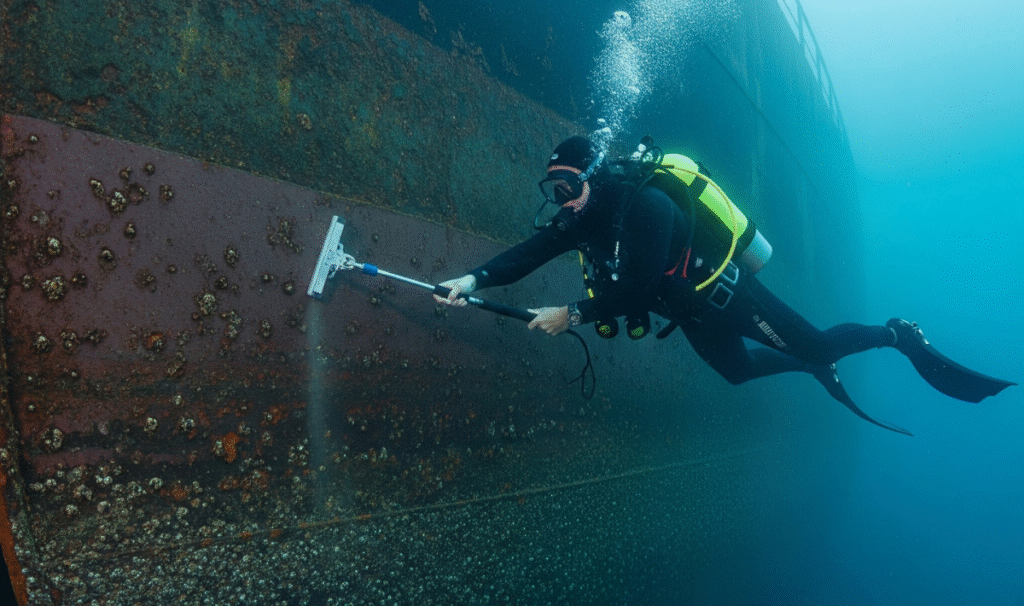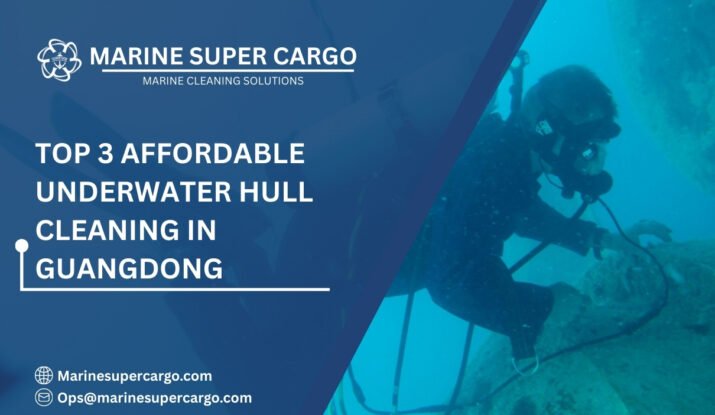Guangdong isn’t just one of China’s most dynamic provinces—it’s the beating heart of world shipping. With ports like Shenzhen, Guangzhou, and Zhuhai bridging trade between East and West, the province sees millions of containers transit each year. And yet, beneath all this maritime activity hides a quieter story: the condition of ship hulls. Biofouling on hulls may seem invisible, but it silently drains fuel, accelerates corrosion, and harms the environment.
That’s why underwater hull cleaning in Guangdong is a powerful yet often overlooked driver of efficiency, safety, and sustainability.
Imagine pushing a cart with clogged wheels. Every step requires extra effort. Ships face the same struggle when barnacles, algae, or mussels coat their hulls. This buildup—known as biofouling—creates drag, drains fuel, and complicates sailing.
In the South China Sea, where Guangdong operates as a megahub of trade, clean hulls equal a competitive advantage. Let’s dive deep into the 3 key benefits of underwater hull cleaning in Guangdong—and why it’s a non-negotiable practice for any vessel moving in or out of this region.
What is Underwater Hull Cleaning in Guangdong?
Underwater hull cleaning refers to removing marine growth and deposits from below a ship’s waterline, without pulling the vessel into dry dock.
- Traditional methods involved divers scraping hulls manually.
- Modern methods include robotic cleaners, high-pressure jets, and suction systems that collect biofouling debris.
According to the International Maritime Organization and International Marine Contractors Association, best practices ensure cleaning improves efficiency without releasing pollutants or invasive species into the sea.
In busy waters like the Pearl River Delta, following these guidelines is essential for both economic performance and environmental responsibility.

Fuel Efficiency and Reduced Costs
A fouled hull is like running with resistance bands. Ships require more fuel to achieve the same speed due to increased drag.
In the shipping-heavy corridors of Guangdong, this inefficiency multiplies quickly. Research shows that without hull cleaning, ships can waste 10–40% more fuel. For operators running fleets through Shenzhen or Guangzhou ports, that equates to millions of dollars annually.
By investing in underwater hull cleaning in Guangdong, vessels enjoy:
- Noticeable fuel savings—less drag means smoother sailing.
- Lower operational costs—fuel is often the single biggest expense for ship operators.
- Faster schedules—vital in competitive transshipment hubs.
It’s like upgrading an old bicycle chain with lubrication—you immediately notice less resistance and improved pace.
Environmental Responsibility and Compliance
Clean hulls don’t just benefit operators—they benefit the planet. Every liter of fuel saved means fewer emissions released into the atmosphere.
Under the MARPOL Convention, explained by Cleanship.co, vessels are required to minimize pollution. For Guangdong’s ports, which play central roles in Chinese and global shipping, compliance is unavoidable.
Benefits include:
- Reduced greenhouse gas emissions—supporting China’s carbon neutrality targets.
- Preventing invasive species transfer—biofouling can spread non-native organisms into Pearl River ecosystems if unchecked.
- Stronger global credibility—ships in Guangdong must prove green practices to remain competitive internationally.
Thus, underwater hull cleaning in Guangdong is a win-win: sustainable trade with global compliance built in.
Longer Vessel Life and Safer Operations
Biofouling does more than slow ships—it eats into their steel. Marine organisms accelerate corrosion, strip coatings, and damage hull integrity.
Routine underwater hull cleaning in Guangdong ensures:
- Extended vessel lifespan—steel stays stronger, coatings last longer.
- Lower repair bills—routine cleaning delays expensive dry dock repairs.
- Safer maneuverability—clean hulls respond better in busy ports like Shenzhen, reducing collision risks.
Think of it as giving your ship regular health checkups—the earlier issues are caught, the longer it stays fit for service.
Why Hull Cleaning Matters for Guangdong
Guangdong is the backbone of China’s export economy. The Greater Bay Area (Shenzhen–Hong Kong–Guangzhou) is one of the busiest manufacturing and shipping clusters worldwide.
Whether it’s electronics, textiles, or consumer goods, everything produced here relies on efficient logistics. By prioritizing underwater hull cleaning in Guangdong, operators help ensure:
- Trade remains punctual and affordable.
- Shipping emissions align with China’s green policies.
- Local marine biodiversity in the Pearl River Delta remains intact.
Innovative Technologies in Hull Cleaning
Modern hull cleaning is no longer just divers scraping steel. Technology has revolutionized the process:
- Robotic crawlers/ROVs provide safer, faster cleanings.
- Eco-friendly suction systems prevent polluted discharge into the sea.
- Smart antifouling coatings proactively hinder biofouling growth.
According to iaphworldports.org, such innovations are shaping global port sustainability programs. As a global logistics hub, Guangdong benefits directly from embracing these upgrades.
Choosing a Reliable Hull Cleaning Provider in Guangdong
Operators should select providers in Guangdong who:
- Follow IMO and IMCA standards for compliance and safety.
- Offer eco-friendly techniques that handle fouling waste responsibly.
- Use advanced robotics instead of fully manual labor.
- Understand local laws—Pearl River Delta regulations must be respected.
Good partnerships ensure clean hulls, fewer delays, and long-term cost savings.

Recap of the 3 Key Benefits
Here’s a recap of the 3 primary benefits of underwater hull cleaning in Guangdong:
- Fuel efficiency & lower costs—less drag means big money saved.
- Environmental compliance—reduce emissions, protect ecosystems, meet MARPOL.
- Longevity & safety—extend hull life, cut repair costs, improve vessel navigation.
Conclusion
In the maritime powerhouse of Guangdong, efficiency is currency. From the busy terminals in Shenzhen to the export giants in Guangzhou, every ship needs to deliver more, faster, and cleaner. That’s where underwater hull cleaning in Guangdong plays its role.
It reduces costs, safeguards the environment, and ensures vessels stay strong and safe. Think of it as polishing a hidden shield beneath your ship: invisible to most eyes, but critical for smooth, profitable operations.
For ship operators, it isn’t just maintenance—it’s a strategic investment in competitiveness and sustainability.
FAQ:
Q1: How often should hull cleaning be done in Guangdong?
Every 6–12 months, depending on ship traffic, coating quality, and fouling conditions in the South China Sea.
Q2: Is hull cleaning mandatory in Guangdong’s ports?
Not always, but compliance with MARPOL and IMO rules effectively makes it essential.
Q3: Can underwater cleaning spread pollutants in the Pearl River Delta?
Improper methods can, but certified eco-friendly systems prevent contamination.
Q4: Does underwater hull cleaning in Guangdong apply only to large ocean vessels?
No, inland vessels, barges, and ferries also benefit greatly from regular cleaning.
Q5: What technologies are shaping the future of hull cleaning in Guangdong?
Robotic ROVs, suction cleaning devices, and next-generation antifouling paints are leading trends.


